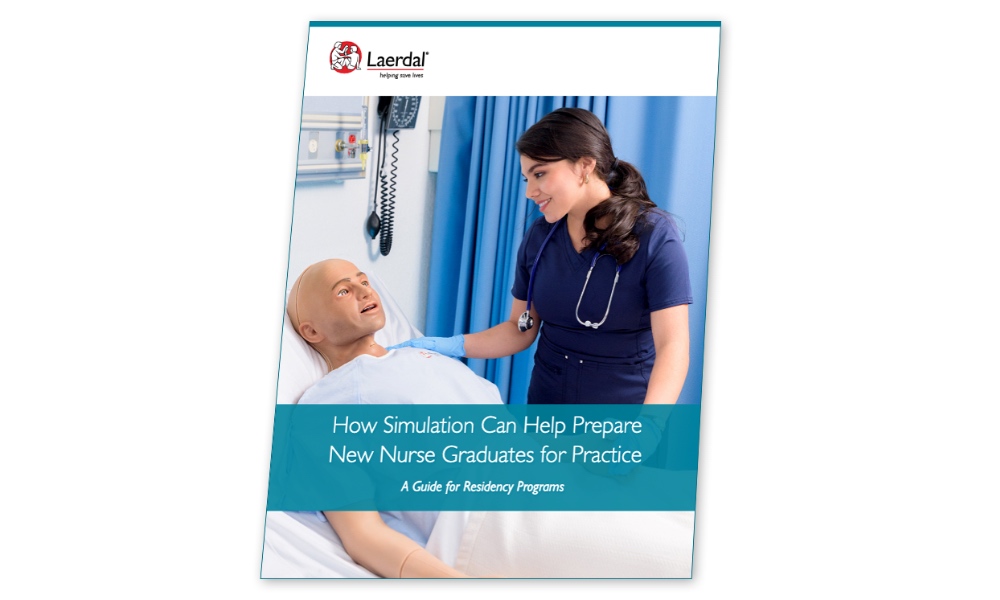How Nursing Simulation Can Help Prepare New Nurse Graduates for Residency: A Laerdal Guide
Laerdal is excited to announce an open access eBook on How Simulation Can Help Prep New Nurse Graduates for Practice: A Guide for Residency Programs. As a leader in clinical simulation, Laerdal realized the gap in academia and readiness for practice for new graduate nurses (NGN). To address the gap, this eBook is intended to provide healthcare organizations with an introduction to how patient simulation can help your New Nurse Graduates (NGNs) make a safe and effective transition from academia to the bedside. This HealthySimulation.com article will provide an overview and highlights of the Laerdal eBook.
The Laerdal Medical eBook covers everything from how simulation can make a difference, to the basics of simulation and how to use the emerging methodology to the fullest potential. The eBook covers approaches for the novice to advance educators / simulationists. Each chapter has a specific focus, so each reader can determine how to navigate the chapters of preference to meet their needs.
Seventy-five percent New Graduate Nurses have committed medication errors, which include handing the wrong medication to the patient, dispensing an incorrect dose, or giving a prescription to the wrong patient. For NGNs, the most common cause of medication errors is traced back to lack of “presence of mind,” as well as nerves and pressure. The eBook provides a specific example of a NGN, Margo and her story. Based her story, simulation could have minimized and help to address the following aspects:
Sponsored Content:
- Confidently communicating concerns about an incorrect dosage
- Grasping the importance of interprofessional communication
- Asking open-ended questions of the patient
- Acknowledging her own potential to contribute to effective team functioning
- Recognizing the importance of asking for help when needed
- Managing stress more effectively
Intended for novice and advanced educators, Laerdal’s eBook is an introduction to how patient
simulation can help you set your NGNs up for success. Simulation’s risk-free, consistent, and repeatable training environment will allow New Graduate Nurses to focus on building the competency and confidence they need for an effective and safe transition to practice.
Nursing Simulation is highly effective for building competency, confidence, and readiness for practice, which strengthens assessment and clinical skills, and enhances the ability to apply critical thinking to simulated patient scenarios. Research shows that simulated nursing experiences help New Nurse Graduates (NGNs) “see the big picture” of patient care, and has shown to reduce NGNs’ anxiety and increase their ability to think critically instead of becoming scared and flustered in a high-stakes situation.
Research supports the use of simulation in a New Graduate Nurse Program or Residency. One study examined the extensive use of simulation as part of an NGN residency program. The study found that the simulations rapidly increased the competencies of the NGNs and their confidence and self-assessed readiness to provide care to patients, and lowered the rate of turnover. Nursing Simulation offers consistency and standardization, giving every NGN the opportunity to practice the same scenarios – ones that they otherwise might not have each encountered. And, simulation is repeatable as learners can practice as many times as the experience takes. The benefits you can reap from simulation extend beyond helping to sharpen NGNs’ critical competencies. Clinical simulation educators may want to consider also using the methodology to evaluate competency development, as well as identify and remediate learning needs.
Sponsored Content:
A survey of 434 NGNs found that most respondents identified more than 100 different skills/procedures they perceived as uncomfortable at 12-months. Well-designed purposeful integration of skills into quality simulation can help build NGN skills and confidence in the following areas:
- IV starts
- Trach/suctioning care
- Venous/arterial/Swan-Ganz lines
- Death/dying/end-of-life care
- Dubhoff/NG tube placement
- Care of unstable, high-risk, complex patient
Another major benefit for increasing confidence and skills in New Nurse Graduates by simulation integration into the nurse residency program is to decrease turnover, decrease use of travel nurses, and increase retention rates.
- Results revealed the NGN turnover rate of 15.5% for residency programs using simulation compared to 26.8% in the control group. This could lead to a potential replacement cost for those RNs at approximately $7.9 million.
- Each percent change in RN turnover could save the average hospital $262,300 per year
- Evidence indicates that a supportive residency program for New Nurse Graduates (NGNs) results in decreased turnover.
- For every 20 travel RNs eliminated, a hospital can save, on average, $4,203,000.29.
- One study found that hospitals with lower turnover rates (between 4% and 12%) had lower risk-adjusted mortality and lower patient lengths of stay than hospitals with moderate (12% to 22%) or high (22% to 44%) turnover rates.
Watch the previously recorded HealthySimulation.com Webinar Competency-Based Clinical Education Solutions from Laerdal Medical to learn more about prepping new graduate nurses.
According to Marlene Kramer, the New Nurse Graduate (NGN) goes through four phases, during which they discover the difference between what they thought nursing would be and what the profession truly is:
- Honeymoon phase: The NGN is excited and optimistic to begin their career.
- Shock phase: The NGN starts discovering disparities between what they were expecting to do based on what they learned in school, and the reality of the actual workplace.
- Recovery phase: “Healing” begins: the NGN starts to understand the new culture, and feelings of tension and anxiety lessen. Their desire to succeed returns.
- Resolution phase: The NGN makes a successful transition to a confident and competent nurse. The nurse has now grown more fully as a person and professionally, and meeting work expectations starts coming more naturally.
So why nursing simulation? The National Council of State Boards of Nursing’s (NCSBN) research noted success in specific patient care concepts. Some of the most important concepts are the focus on patient-centered care to improve safety through effective communication and teamwork. NGN can improve clinical reasoning based on evidence-based practice, feedback and reflection. This can lead to quality improvements and increased knowledge in the specific practice area of the NGN. Informatics is integrated throughout the simulation program and increases the use and confidence in the use of technology. This assists in the achievement of the ultimate goal of fewer patient care errors reported and negative safety practices which leads to higher levels of competency, lower stress levels, and higher job satisfaction.
The eBook assists the educators with linking the Quality and Safety Education for Nurses (QSEN) competencies throughout the simulation program. The competencies are the areas noted above in the NCSBN concepts. These competencies introduce the New Graduate Nurses to a culture of safety to improve patient care and outcomes.
Laerdal identifies the Circle of Learning Phases of knowledge acquisition, skills proficiency, decision-making, simulation in teams, and clinical experience. The critical step for experiential learning is the debriefing. Laerdal incorporated the INACSL’s Healthcare Simulation Standards of Best Practice into this program. This open access eBook offers the nursing simulation community an extremely beneficial product.
Visit Laerdal to Download the New Graduate Nurse Simulation eBook
Teresa Gore, PhD, DNP, APRN, FNP-BC, CHSE-A, FSSH, FAAN – Dr. Gore has experience in educating future nurses in the undergraduate and graduate nursing programs. Dr. Gore has a PhD in Adult Education, a DNP as a family nurse practitioner, and a certificate in Simulation Education. Dr. Gore is an innovative, compassionate educator and an expert in the field of healthcare simulation. In 2007l Teresa started her journey in healthcare simulation. She is involved in INACSL and SSH. She is a Past-President of INACSL and is a Certified Healthcare Simulation Educator Advanced (CHSE-A). In 2018, she was inducted as a Fellow in the American Academy of Nursing (FAAN). In 2021, she was inducted as a Fellow in the Society of Simulation in Healthcare Academy (FSSH) and selected as a Visionary Leader University of Alabama at Birmingham School of Nursing Alumni. During her career, Dr. Gore has led in the development and integration of simulation into all undergraduate clinical courses and started an OSCE program for APRN students. Her research interests and scholarly work focus on simulation, online course development and faculty development. She has numerous invited presentations nationally and internationally on simulation topics.
Sponsored Content:






















